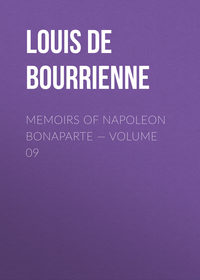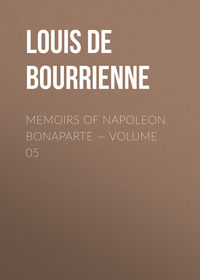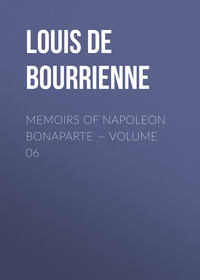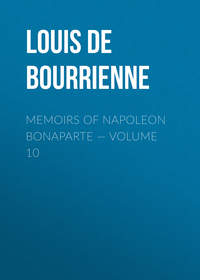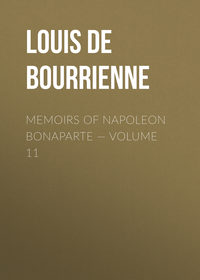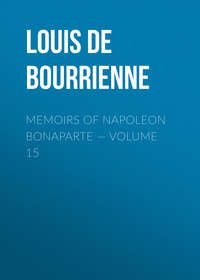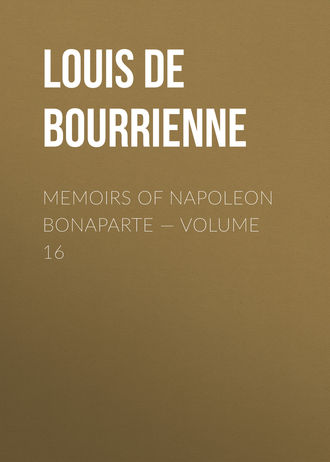 полная версия
полная версияMemoirs of Napoleon Bonaparte — Volume 16
An almost incredible instance of the determination of the exiles to make as many enemies as they possibly could was exhibited to Antommarchi on his arrival at Longwood. He states that before he was permitted to enter on his functions as surgeon he was required to take an oath that he would not communicate with the English, and that he would more especially avoid giving them the least information respecting the progress of Napoleon's disorder. He was not allowed to see his illustrious patient until the oath was taken. After exacting such an oath from his physician the attendants of Bonaparte had little right to complain, as they did, that the real state of his disorder was purposely concealed from the world by the English Government. It is more than probable that the constant attempts observed to throw mystery and secrecy around them must have tended to create the suspicion of escape, and to increase the consequent rigour of the regulations maintained by the Governor.
Soon after the arrival of the priests Napoleon determined, we may suppose partly in jest, to elevate one of them to the dignity of bishop, and he chose for a diocese the Jumna. "The last box brought from Europe had been broken open," says Antommarchi; "it contained the vases and church ornaments. "Stop," said Napoleon, "this is the property of St. Peter; have a care who touches it; send for the abbes—but talking of the abbes, do you know that the Cardinal [Fesch] is a poor creature? He sends me missionaries and propagandists, as if I were a penitent, and as if a whole string of their Eminences had not always attended at my chapel. I will do what he ought to have done; I possess the right of investiture, and I shall use it." Abbe Buonavita was just entering the room, "'I give you the episcopal mitre.'—'Sire!'—'I restore it to you; you shall wear it in spite of the heretics; they will not again take it from you.'— 'But, Sire!'—'I cannot add to it so rich a benefice as that of Valencia, which Suchet had given you, but at any rate your see shall be secure from the chances of battles. I appoint you Bishop of—let me see—of the Jumna. The vast countries through which that river flows were on the point of entering into alliance with me—all was in readiness, all were going to march. We were about to give the finishing blow to England." The speech concluded with an order to Count Montholon to procure the necessary dress for the abbe in order to strike with awe all the heretics. The upshot of the whole was, that the scarlet and violet coloured clothes necessary to furnish the new bishop with the only valuable portion of his temporalities, his dress, could not be procured in the island, and the abbe remained an abbe in spite of the investiture, and the whole farce was forgotten.
We occasionally see the Exile in better moods, when he listened to the voice of reason, and thought less of the annoyances inseparable from the state to which his ambition, or as he himself always averred, his destiny, had reduced him. He had for a long time debarred himself from all exercise, having, as he expressed it, determined not to expose himself to the insult of being accompanied on his ride by a British officer; or the possibility of being challenged by a sentinel. One day when he complained of his inactive life his medical attendant recommended the exercise of digging the ground; the idea was instantly seized upon by Napoleon with his characteristic ardour. Noverraz, his chasseur, who had been formerly accustomed to rural occupations, was honoured with the title of head gardener, and under his directions Napoleon proceeded to work with great vigour. He sent for Antommarchi to witness his newly acquired dexterity in the use of the spade. "Well, Doctor," said he to him, "are you satisfied with your patient—is he obedient enough? This is better than your pills, Dottoraccio; you shall not physic me any more." At first he soon got fatigued, and complained much of the weakness of his body and delicacy of his hands; but "never mind," said he, "I have always accustomed my body to bend to my will, and I shall bring it to do so now, and inure it to the exercise." He soon grew fond of his new employment, and pressed all the inhabitants of Longwood into the service. Even the ladies had great difficulty to avoid being set to work. He laughed at them, urged them, entreated them, and used all his arts of persuasion, particularly with Madame Bertrand. He assured her that the exercise of gardening was much better than all the doctor's prescriptions—that it was in fact one of his prescriptions. But in this instance his eloquence failed in its effect, and he was obliged, though with much reluctance, to desist from his attempts to make lady gardeners.
But in recompense he had willing labourers on the part of the gentlemen. Antommarchi says, "The Emperor urged us, excited us, and everything around us soon assumed a different aspect. Here was an excavation, there a basin or a road. We made alleys, grottoes, cascades; the appearance of the ground had now some life and diversity. We planted willows, oaks, peach-trees, to give a little shade round the house. Having completed the ornamental part of our labours we turned to the useful. We divided the ground, we manured it, and sowed it with abundance of beans, peas, and every vegetable that grows in the island." In the course of their labours they found that a tank would be of great use to hold water, which might be brought by pipes from a spring at a distance of 3000 feet.
For this laborious attempt it was absolutely necessary to procure additional forces, and a party of Chinese, of whom there are many on the island, was engaged to help them. These people were much amused at Napoleon's working-dress, which was a jacket and large trousers, with an enormous straw hat to shield him from the sun, and sandals. He pitied those poor fellows who suffered from the heat of the sun, and made each of them a present of a large hat like his own. After much exertion the basin was finished, the pipes laid, and the water began to flow into it. Napoleon stocked his pond with gold-fish, which he placed in it with his own hands. He would remain by the pond for hours together, at a time when he was so weak that he could hardly support himself. He would amuse himself by following the motion of the fishes, throwing bread to them, studying their ways, taking an interest in their loves and their quarrels, and endeavouring with anxiety to find out points of resemblance between their motives and those of mankind. He often sent for his attendants to communicate his remarks to them, and directed their observations to any peculiarities he had observed. His favourites at last sickened, they struggled, floated on the water, and died one after another. He was deeply affected by this, and remarked to Antommarchi, "You see very well that there is a fatality attached to me. Everything I love, everything that belongs to me, is immediately struck: heaven and mankind unite to persecute me." From this time he visited them daily in spite of sickness or bad weather, nor did his anxiety diminish until it was discovered that a coppery cement, with which the bottom of the basin was plastered, had poisoned the water. The fish which were not yet dead were then taken out and put into a tub.
Napoleon appears to have taken peculiar interest in observing the instincts of animals, and comparing their practices and propensities with those of men. A rainy day, during which the digging of the tank could not be proceeded with, gave occasion for some observations on the actions of a number of ants, which had made a way into his bedroom, climbed upon a table on which some sugar usually stood, and taken possession of the sugar-basin. He would not allow the industrious little insects to be disturbed in their plans; but he now and then moved the sugar, followed their manoeuvres, and admired the activity and industry they displayed until they found it again; this they had been sometimes even two or three days in effecting, though they always succeeded at last. He then surrounded the basin with water, but the ants still reached it; he finally employed vinegar, and the insects were unable to get through the new obstacle.
But the slight activity of mind that now remained to him was soon to be exchanged for the languor and gloom of sickness, with but few intervals between positive suffering and the most distressing lowness of spirits. Towards the end of the year 1820 he walked with difficulty, and required assistance even to reach a chair in his garden. He became nearly incapable of the slightest action; his legs swelled; the pains in his side and back were increased; he was troubled with nausea, profuse sweats, loss of appetite, and was subject to frequent faintings. "Here I am, Doctor," said he one day, "at my last cast. No more energy and strength left: I bend under the load . . . . I am going. I feel that my hour is come."
Some days after, as he lay on his couch, he feelingly expressed to Antommarchi the vast change which had taken place within him. He recalled for a few moments the vivid recollection of past times, and compared his former energy with the weakness which he was then sinking under.
The news of the death of his sister Elisa also affected him deeply. After a struggle with his feelings, which had nearly overpowered him, he rose, supported himself on Antommarchi's arm; and regarding him steadfastly, said, "Well, Doctor! you see Elisa has just shown me the way. Death, which seemed to have forgotten my family, has begun to strike it; my turn cannot be far off. What think you?"—"Your Majesty is in no danger: you are still reserved for some glorious enterprise."— "Ah, Doctor! I have neither strength nor activity nor energy; I am no longer Napoleon. You strive in vain to give me hopes, to recall life ready to expire. Your care can do nothing in spite of fate: it is immovable: there is no appeal from its decisions. The next person of our family who will follow Elisa to the tomb is that great Napoleon who hardly exists, who bends under the yoke, and who still, nevertheless keeps Europe in alarm. Behold, my good friend, how I look on my situation! As for me, all is over: I repeat it to you, my days will soon close on this miserable rock."—"We returned," says Antommarchi, "into his chamber. Napoleon lay down' in bed. 'Close my windows,' he said; leave me to myself; I will send for you by-and-by. What a delightful thing rest is! I would not exchange it for all the thrones in the world! What an alteration! How I am fallen! I, whose activity was boundless, whose mind never slumbered, am now plunged into a lethargic stupor, so that it requires an effort even to raise my eyelids. I sometimes dictated to four or five secretaries, who wrote as fast as words could be uttered, but then I was NAPOLEON—now I am no longer anything. My strength—my faculties forsake me. I do not live—I merely exist.'"
From this period the existence of Napoleon was evidently drawing to a close his days were counted. Whole hours, and even days, were either passed in gloomy silence or spent in pain, accompanied by distressing coughs, and all the melancholy signs of the approach of death. He made a last effort to ride a few miles round Longwood on the 22d of January 1821, but it exhausted his strength, and from that time his only exercise was in the calash. Even that slight motion soon became too fatiguing.
He now kept his room, and no longer stirred out. His disorder and his weakness increased upon him. He still was able to eat something, but very little, and with a worse appetite than ever. "Ah! doctor," he exclaimed, "how I suffer! Why did the cannon-balls spare me only to die in this deplorable manner? I that was so active, so alert, can now scarcely raise my eyelids!"
His last airing was on the 17th of March. The disease increased, and Antommarchi, who was much alarmed, obtained with some difficulty permission to see an English physician. He held a consultation, on the 26th of March, with Dr. Arnott of the 20th Regiment; but Napoleon still refused to take medicine, and often repeated his favourite saying: "Everything that must happen is written down our hour is marked, and it is not in our power to take from time a portion which nature refuses us." He continued to grow worse, and at last consented to see Dr. Arnott, whose first visit was on the 1st of April He was introduced into the chamber of the patient, which was darkened, and into which Napoleon did not suffer any light to be brought, examined his pulse and the other symptoms, and was requested to repeat his visit the next day. Napoleon was now within a month of his death, and although he occasionally spoke with the eloquence and vehemence he had so often exhibited, his mind was evidently giving way. The reported appearance of a comet was taken as a token of his death. He was excited, and exclaimed with emotion, "A comet! that was the precursor of the death of Caesar."
On the 3d of April the symptoms of the disorder had become so alarming that Antommarchi informed Bertrand and Montholon he thought Napoleon's danger imminent, and that Napoleon ought to take steps to put his affairs in order. He was now attacked by fever and by violent thirst, which often interrupted his sleep in the night. On the 14th Napoleon found himself in better spirits, and talked with Dr. Arnott on the merits of Marlborough, whose Campaigns he desired him to present to the 20th Regiment, learning that they did not, possess a copy in their library.
On the 15th of April Napoleon's doors were closed to all but Montholon and Marchand, and it appeared that he had been making his Will. On the 19th he was better, was free from pain, sat up, and ate a little. He was in good spirits, and wished them to read to him. As General Montholon with the others expressed his satisfaction at this improvement he smiled gently, and said, "You deceive yourselves, my friends: I am, it is true, somewhat better, but I feel no less that my end draws near. When I am dead you will have the agreeable consolation of returning to Europe. One will meet his relations, another his friends; and as for me, I shall behold my brave companions-in-arms in the Elysian Fields. Yes," he went on, raising his voice, "Kleber, Desaix, Bessieres, Duroc, Ney, Murat, Massena, Berthier, all will come to greet me: they will talk to me of what we have done together. I will recount to them the latest events of my life. On seeing me they will become once more intoxicated with enthusiasm and glory. We will discourse of our wars with the Scipios, Hannibal, Caesar, and Frederick—there will be a satisfaction in that: unless," he added, laughing bitterly, "they should be alarmed below to see so many warriors assembled together!"
He addressed Dr. Arnott, who came in while he was speaking, on the treatment he had received from England said that she had violated every sacred right in making him prisoner, that he should have been much better treated in Russia, Austria, or even Prussia; that he was sent to the horrible rock of St. Helena on purpose to die; that he had been purposely placed on the most uninhabitable spot of that inhospitable island, and kept six years a close prisoner, and that Sir Hudson Lowe was his executioner. He concluded with these words: "You will end like the proud republic of Venice; and I, dying upon this dreary rock, away from those I hold dear, and deprived of everything, bequeath the opprobrium and horror of my death to the reigning family of England."
On the 21st Napoleon gave directions to the priest who was in attendance as to the manner in which he would be placed to lie in state after his death; and finding his religious attendant had never officiated in such a solemnity he gave the most minute instructions for the mode of conducting it. He afterwards declared that he would die, as he was born a Catholic, and desired that mass should be said by his body, and the customary ceremonies should be performed every day until his burial. The expression of his face was earnest and convulsive; he saw Antommarchi watching the contractions which he underwent, when his eye caught some indication that displeased him. "You are above these weaknesses; but what would you have? I am neither philosopher nor physician. I believe in God; I am of the religion of my fathers; every one cannot be an atheist who pleases." Then turning to the priest—"I was born in the Catholic religion. I wish to fulfil the duties which it imposes, and to receive the succour which it administers. You will say mass every day in the adjoining chapel, and you will expose the Holy Sacrament for forty hours. After I am dead you will place your altar at my head in the funeral chamber; you will continue to celebrate mass, and perform all the customary ceremonies; you will not cease till I am laid in the ground." The Abbe (Vignale) withdrew; Napoleon reproved his fellow-countryman for his supposed incredulity. "Can you carry it to this point? Can you disbelieve in God? Everything proclaims His existence; and, besides, the greatest minds have thought so."—"But, Sire, I have never called it in question. I was attending to the progress of the fever: your Majesty fancied you saw in my features an expression which they had not."— "You are a physician, Doctor," he replied laughingly; "these folks," he added, half to himself, "are conversant only with matter; they will believe in nothing beyond."
In the afternoon of the 25th he was better; but being left alone, a sudden fancy possessed him to eat. He called for fruits, wine, tried a biscuit, then swallowed some champagne, seized a bunch of grapes, and burst into a fit of laughter as soon as he saw Antommarchi return. The physician ordered away the dessert, and found fault with the maitre d'hotel; but the mischief was done, the fever returned and became violent. The Emperor was now on his death-bed, but he testified concern for every one. He asked Antommarchi if 500 guineas would satisfy the English physician, and if he himself would like to serve Maria Louisa in quality of a physician? "She is my wife, the first Princess in Europe, and after me you should serve no one else." Antommarchi expressed his acknowledgments. The fever continued unabated, with violent thirst and cold in the feet. On the 27th he determined to remove from the small chamber into the salon. They were preparing to carry him. "No," he said, "not until I am dead; for the present it will be sufficient if you support me."
Between the 27th and 28th the Emperor passed a very bad night; the fever increased, coldness spread over his limbs, his strength was quite gone. He spoke a few words of encouragement to Antommarchi; then in a tone of perfect calmness and composure he delivered to him the following instructions: "After my death, which cannot be far off, I wish you to open my body: I wish also, nay, I require, that you will not suffer any English physician to touch me. If, however, you find it indispensable to have some one to assist you, Dr. Arnott is the only one I am willing you should employ. I am desirous, further, that you should take out my heart, that you put it in spirits of wine, and that you carry it to Parma to my dear Maria Louisa: you will tell her how tenderly I have loved her, that I have never ceased to love her; and you will report to her all that you have witnessed, all that relates to my situation and my death. I recommend you, above all, carefully to examine my stomach, to make an. exact detailed report of it, which you will convey to my son. The vomitings which succeed each other without intermission lead me to suppose that the stomach is the one of my organs which is the most deranged, and I am inclined to believe that it is affected with the disease which conducted my father to the grave,—I mean a cancer in the lower stomach. What think you? "His physician hesitating, he continued —"I have not doubted this since I found the sickness become frequent and obstinate. It is nevertheless well worthy of remark that I have always had a stomach of iron, that I have felt no inconvenience from this organ till latterly, and that whereas my father was fond of high-seasoned dishes and spirituous liquors, I have never been able to make use of them. Be it as it may, I entreat, I charge you to neglect nothing in such an examination, in order that when you see my son you may communicate the result of your observations to him, and point out the most suitable remedies. When I am no more you will repair to Rome; you will find out my mother and my family. You will give them an account of all you have observed relative to my situation, my disorder, and my death on this remote and miserable rock; you will tell them that the great Napoleon expired in the most deplorable state, wanting everything, abandoned to himself and his glory." It was ten in the forenoon; after this the fever abated, and he fell into a sort of doze.
The Emperor passed a very bad night, and could not sleep. He grew light- headed and talked incoherently; still the fever had abated in its violence. Towards morning the hiccough began to torment him, the fever increased, and he became quite delirious. He spoke of his complaint, and called upon Baxter (the Governor's physician) to appear, to come and see the truth of his reports. Then all at once fancying O'Meara present, he imagined a dialogue between them, throwing a weight of odium on the English policy. The fever having subsided, his hearing became distinct; he grew calm, and entered into some further conversation on what was to be done after his death. He felt thirsty, and drank a large quantity of cold water. "If fate should determine that I shall recover, I would raise a monument on the spot where this water gushes out: I would crown the fountain in memory of the comfort which it has afforded me. If I die, and they should not proscribe my remains as they have proscribed my person, I should desire to be buried with my ancestors in the cathedral of Ajaccio, in Corsica. But if I am not allowed to repose where I was born, why, then, let them bury me at the spot where this fine and refreshing water flows." This request was afterwards complied with.
He remained nearly in the same state for some days. On the 1st of May he was delirious nearly all day, and suffered dreadful vomitings. He took two small biscuits and a few drops of red wine. On the 2d he was rather quieter, and the alarming symptoms diminished a little. At 2 P.M., however, he had a paroxysm of fever, and became again delirious. He talked to himself of France, of his dear son, of some of his old companions-in-arms. At times he was evidently in imagination on the field of battle. "Stengel!" he cried; "Desaix! Massena! Ah! victory is declaring itself! run—rush forward—press the charge!—they are ours!"
"I was listening," says Dr. Antommarchi, "and following the progress of that painful agony in the deepest distress, when Napoleon, suddenly collecting his strength, jumped on the floor, and would absolutely go down into the garden to take a walk. I ran to receive him in my arms, but his legs bent under the weight of his body; he fell backwards, and I had the mortification of being unable to prevent his falling. We raised him up and entreated him to get into bed again; but he did not recognise anybody, and began to storm and fall into a violent passion. He was unconscious, and anxiously desired to walk in the garden. In the course of the day, however, he became more collected, and again spoke of his disease, and the precise anatomical examination he wished to be made of his body after death. He had a fancy that this might be useful to his son." "The physicians of Montpelier," he said to Antommarchi, "announced that the scirrhosis in the pylorus would be hereditary in my family; their report is, I believe, in the hands of my brother Louis; ask for it and compare it with your own observations on my case, in order that my son may be saved from this cruel disease. You will see him, Doctor, and you will point out to him what is best to do, and will save him from the cruel sufferings I now experience. This is the last service I ask of you." Later in the day he said, "Doctor, I am very ill—I feel that I am going to die."
The last time Napoleon spoke, except to utter a few short unconnected words, was on the 3d of May. It was in the afternoon, and he had requested his attendants, in case of his losing consciousness, not to allow any English physician to approach him except Dr. Arnott. "I am going to die," said he, "and you to return to Europe; I must give you some advice as to the line of conduct you are to pursue. You have shared my exile, you will be faithful to my memory, and will not do anything that may injure it. I have sanctioned all proper principles, and infused them into my laws and acts; I have not omitted a single one. Unfortunately, however, the circumstances in which I was placed were arduous, and I was obliged to act with severity, and to postpone the execution of my plans. Our reverses occurred; I could not unbend the bow; and France has been deprived of the liberal institutions I intended to give her. She judges me with indulgence; she feels grateful for my intentions; she cherishes my name and my victories. Imitate her example, be faithful to the opinions we have defended, and to the glory we have acquired: any other course can only lead to shame and confusion."


